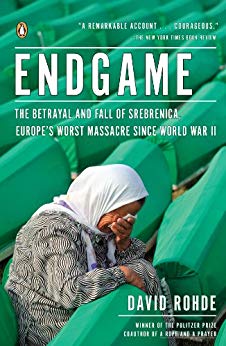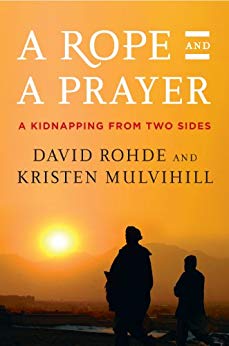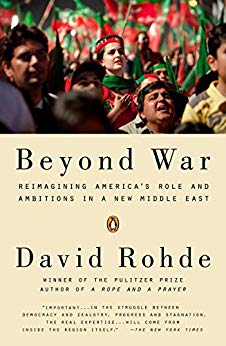Background
David Rohde was born on August 7, 1967 in Hartford, Connecticut, United States, into the family of Harvey L. Rohde Jr. and Carol Ruffo.

Providence, RI 02912, USA
David S. Rohde completed his Bachelor of Arts in History at Brown University in Providence in 1990.
745 Main St, Fryeburg, ME 04037, USA
David S. Rohde attended the private Fryeburg Academy.
Spokesperson Psaki Holds a Conversation With American Journalist David Rohde











(Endgame is the full-length narrative of the nightmare Roh...)
Endgame is the full-length narrative of the nightmare Rohde stumbled upon in the town of Srebrenica, where a massacre of historic proportions has been allowed to happen due to the negligence of the United States, NATO, and the United Nations.
https://www.amazon.com/gp/product/B006CU9Y1S/?tag=2022091-20
1997

(The compelling and insightful account of a New York Times...)
The compelling and insightful account of a New York Times reporter's abduction by the Taliban, and his wife's struggle to free him.
https://www.amazon.com/Rope-Prayer-Story-Kidnapping-ebook/dp/B0040SYIZQ/?tag=2022091-20
2010

(A groundbreaking look at America’s role in the Middle Eas...)
A groundbreaking look at America’s role in the Middle East. Beyond War is a clarion call for change in American policies and attitudes toward a rapidly changing Middle East.
https://www.amazon.com/gp/product/B008EKMBMI/?tag=2022091-20
2013
David Rohde was born on August 7, 1967 in Hartford, Connecticut, United States, into the family of Harvey L. Rohde Jr. and Carol Ruffo.
David S. Rohde attended the private Fryeburg Academy. He also completed his Bachelor of Arts in History at Brown University in Providence in 1990.
David Rohde firstly worked as a production secretary for the ABC News World News Tonight program from 1990 to 1991 and as a production associate for ABC's New Turning Point from January to July 1993. He has also worked as a freelance reporter based in the Baltic republics, Cuba, and Syria. He served as a county and municipal reporter for The Philadelphia Inquirer from 1993 to 1994 before joining The Christian Science Monitor.
At the time of war, Rohde was the Balkan correspondent for the Christian Science Monitor. Having heard stories of the executions and armed with a faxed satellite photo of suspected grave sites, he entered Serb-held Bosnia in August and became the first Western observer to return with evidence corroborating the rumors. He made a second foray in October and discovered more sites, but was captured by the Serbs and spent ten days in prison before pressure from the Clinton administration brought about his release. David joined The New York Times in April 1996 and worked for it through mid-2011.
Rohde’s work in Bosnia is brought together in Endgame: The Betrayal and Fall of Srebrenica, Europe's Worst Massacre since World War II. The book gives a day-by-day account of the city’s fall through the eyes of seven principal witnesses representing the various sides in the conflict: three Muslims (including two men who survived the exterminations), a Bosnian Serb and a Croat soldier fighting with the Serbs, and two Dutch peacekeepers. Critics found that Rohde’s collage of voices effectively sets the often arbitrary and ill-considered decisions of the leaders beside the typically catastrophic effects of those decisions on ordinary people.
Since joining the New York Times, Rohde has reported on peacekeeping operations in Afghanistan and Iraq, as well as on released detainees at the Guantanamo Bay Naval Base detention center. In November 2008 Rohde was abducted by fighters of the radical Islamist Taliban while researching for a new book with a local colleague and a driver outside Kabul. After seven months hostage, Rohde and the local reporter managed to escape. Due to a initiated by the New York Times cooperation of several news agencies and websites, which had agreed to protect the hostages silence, the kidnapping was made public only after Rohde successful escape.
From 2002 until 2005, he was co-chief of The New York Times' South Asia bureau, based in New Delhi, India. He is also a global affairs analyst for CNN. David Stephenson Rohde currently serves as the online news director for The New Yorker.
David Rohde was awarded a Pulitzer Prize for international reporting, in 1996, for stories that helped expose the Srebrenica massacre during the war in Bosnia, and, in 2009, he shared a Pulitzer Prize with a team of Times reporters for coverage of Afghanistan and Pakistan. In January 2012, Rohde was named one of the International Press Institute's World Press Freedom Heroes.
(Endgame is the full-length narrative of the nightmare Roh...)
1997(The compelling and insightful account of a New York Times...)
2010(A groundbreaking look at America’s role in the Middle Eas...)
2013Quotations: “The international community partially disarmed thousands of men, promised them they would be safeguarded and then delivered them to their sworn enemies. Srebrenica was not simply a case of the international community standing by as a far-off atrocity was committed. The actions of the international community encouraged, aided and emboldened the executioners.”
David was described by his Times colleagues as "an intrepid yet unassuming reporter who conducts himself modestly around the office, predictably attired in neatly ironed Oxford shirts and, often, his weathered Boston Red Sox cap."
David Rohde lives in New York with his wife Kristen Mulvihill and two daughters.
